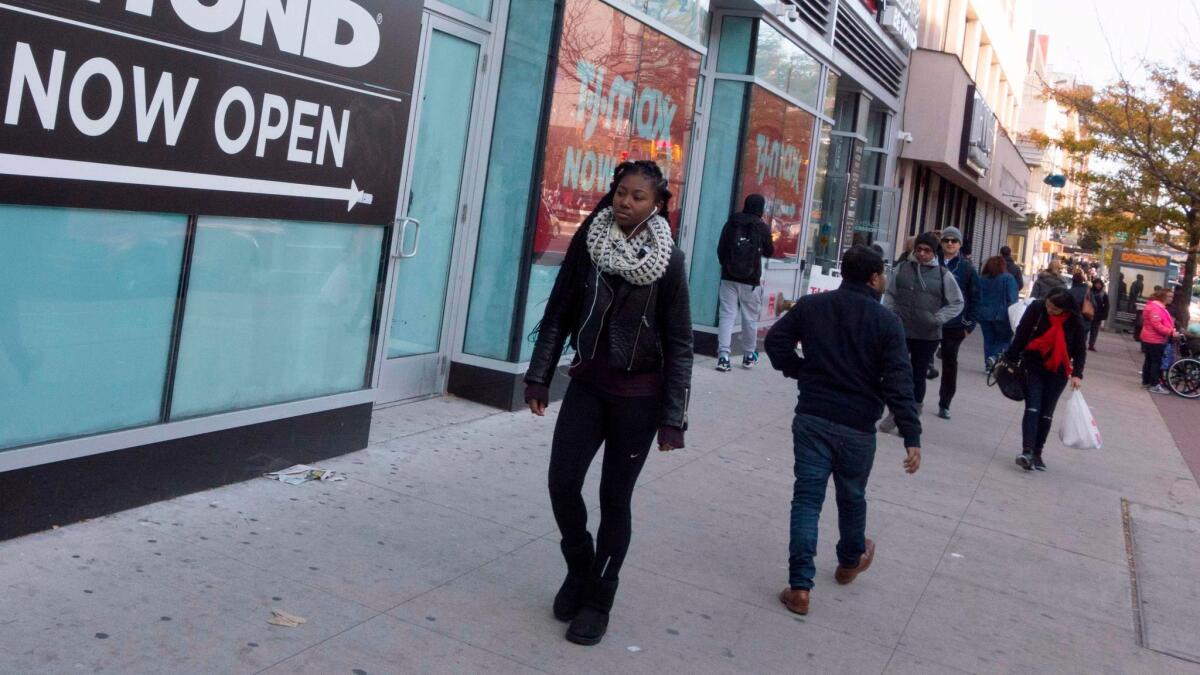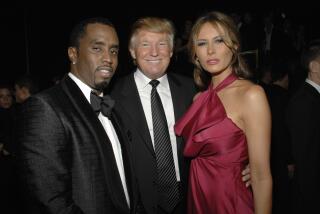Column: Black unemployment jumps, depriving Trump of an economic talking point he never deserved

- Share via
As an example of what the great press critic A.J. Liebling used to call “the futility of flapdoodle,” let’s examine Friday’s release of jobs and unemployment figures, specifically the unemployment rate among black workers.
That rate jumped to 7.7% in January, up from 6.8% in December and back nearly to its 7.8% level when President Trump took office.
Monthly unemployment figures are known to be volatile. That’s especially true among subgroups such as races because the statistical samples are smaller. What’s important about this month’s figures is that they put the lie to a Trump talking point, which is that he has brought the black unemployment rate to the “LOWEST EVER RECORDED,” as he tweeted at the entertainer/entrepreneur Jay-Z just a few days ago.
The Trump administration was handed an economy and a labor market whose health had improved radically.
— Elise Gould, Economic Policy Institute
Jay-Z had the temerity to criticize Trump’s attitude toward minorities, earning the petulant response, but Trump also had, er, Trumpeted the black unemployment rate in a tweet after the December figures were released a month ago.
Labor economists know that unemployment rates are sensitive to many factors that often work at cross-purposes. A falling rate isn’t always unalloyed good news; it can reflect increases in employment, which is good, but also shrinking job-seeking among the employable, which is not so good. The same goes for a rising rate — it can mean that economic conditions have turned sufficiently positive to goad the formerly hopeless into job-hunting.
The January BLS figures on black employment tell such a glass-half-full/glass-half-empty story. The black civilian labor force of 20.2 million is larger now than a year ago by about 220,000. There are about 7,000 fewer black workers unemployed. (These figures are all seasonally adjusted.) But the ranks of the unemployed haven’t shrunk as fast as the black labor force has expanded, pushing the unemployment rate higher.
The participation rate — the ratio of the employed to the number of workers actively seeking jobs — fell among blacks more sharply than among whites, falling to 62.0% from 62.3%, compared with a decline among whites to 62.7% from 62.8%.
The political issue, as articulated by Trump, concerns what he had to do with any of these statistics. Elise Gould of the progressive Economic Policy Institute contends that the recent decline in the black unemployment rate is due to an “autopilot” effect, reflecting trends in place well before Trump took office.
“The Trump administration,” she wrote, “was handed an economy and a labor market whose health had improved radically (if too slowly) over the preceding eight years, and which was trending steadily in an even better direction.”
The black unemployment rate peaked at 16.8% in March 2010 and has been falling fairly steady since then. During the Obama administration, the rate came down by six percentage points from its post-recession peak. Through December, it fell another percentage point under Trump, a gain that has now mostly disappeared.
What’s really telling is that the differential between the white and black unemployment rates has been stickier than the rates themselves. As Kevin Drum of Mother Jones observed last month, it had been falling modestly since the post-recession peak to about 3.1 percentage points. (It bounced back up to 4.2 percentage points in January.)
“The good news,” Drum wrote, “is that during economic expansions, the gap has been in the 4-5 percent range for the past two decades. The bad news is that the gap has been in the 4-5 percent range for the past two decades.”
The warning sign embedded in the data is that the differential soars during and immediately after recessions. It topped eight percentage points in late 2011, after the last recession, for example.
That’s an indication that a fundamental imbalance in the U.S. job market hasn’t been addressed: Blacks get laid off faster than whites when the economy turns south, and they get hired back more slowly. That should set off alarm bells about the recession yet to come. If Trump could solve that problem, he’s have something to crow about. Something real.
Keep up to date with Michael Hiltzik. Follow @hiltzikm on Twitter, see his Facebook page, or email [email protected].
Return to Michael Hiltzik’s blog.
More to Read
Inside the business of entertainment
The Wide Shot brings you news, analysis and insights on everything from streaming wars to production — and what it all means for the future.
You may occasionally receive promotional content from the Los Angeles Times.











